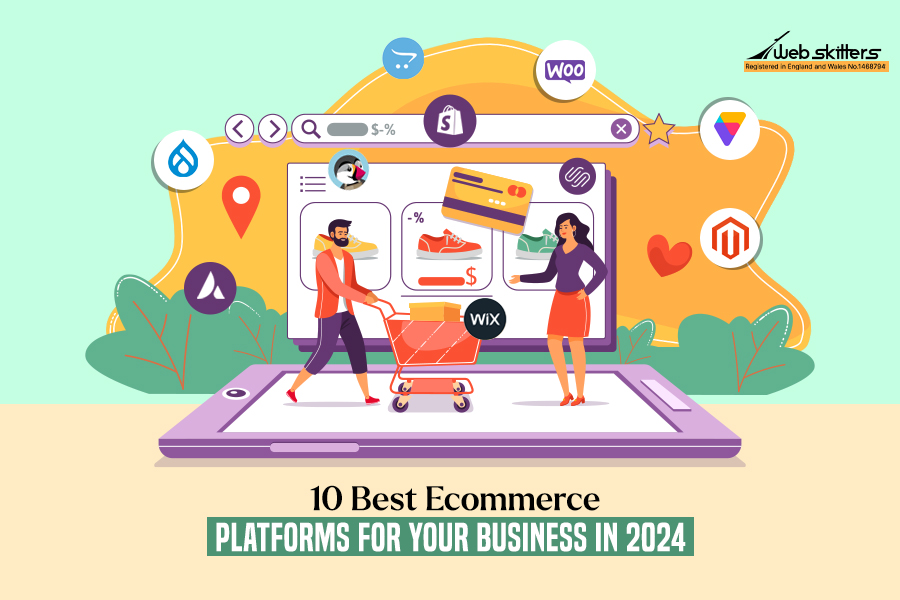- Which platform is the best for e-commerce business?
- Significance of Selecting the Right E-commerce Platform
- Some notable trends we are anticipating for 2024
- Factors to Consider When Choosing an E-commerce Platform
- Overview of the Top 10 Ecommerce Platforms for 2024
- Are you planning to start an e-commerce business in 2024? You will need a stunning website to begin with.
- Quick Comparison Chart
- Embarking on the E-commerce Journey
Are you planning to start an e-commerce business in 2024? You will need a stunning website to begin with.
The need for a functional website is the epitome of the e-commerce industry. However, building one from scratch without technical expertise can be daunting. Several small business owners struggle with understanding the perquisites of building websites.
Their recurrent pain points are – how to launch a website? Which is the best ecommerce development platform for business? What tools are required post-website launch?
Let us solve the most dominant pain point today –
Which platform is the best for e-commerce business?
Choosing the right e-commerce platform is crucial to launching an e-commerce store. This step comes even before a website design plan. The right platform ensures smooth functionality and growth. In this rapidly advancing e-commerce industry, the perfect platform strengthens the foundation.
There are multiple e-commerce platforms to choose from. Each platform has its unique features. It is essential to look for minor differences since these can heavily impact your online presence.
This article will explore the 10 best e-commerce platforms, perfect for small businesses. We will share a detailed overview of each, their features and functionalities and the scope of scalability.
We will also delve into their recent upgrades and real-time usage experiences to help you make an informed decision for your business.
Significance of Selecting the Right E-commerce Platform
Globally, there are 26 million e-commerce websites spread across the major technologies. The United Kingdom has the third-largest e-commerce base in the world, and the revenue will likely be around 227 GBP by 2025.
The country has 1.2 million e-commerce stores. Each of these websites runs on popular platforms. The three most employed platforms are Shopify, Woocommerce and Wix. Precisely, 21% of these websites run on Shopify and 17% use WooCommerce.
Making it big in this domain as a small business amidst such competition demands crucial platform decision-making. Especially when launching a web presence, it is necessary to be mindful.
The e-commerce platform is the foundation for your online store, impacting its functionality, performance, and user experience. The perfect platform helps streamline operations, enhance customer satisfaction, and facilitate growth. Contrastingly, a poor platform choice may lead to operational inefficiencies, security vulnerabilities, and a subpar web presence.
Choosing the right e-commerce platform is similar to finding a trustworthy business partner.
It plays a significant role in the following aspects:
- User Experience: A seamless and intuitive user interface significantly enhances the retail experience. A sturdy e-commerce platform ensures effortless website navigability for the users, leading to increased journey completion and higher conversions.
- Scalability: As the business expands, your e-commerce platform should have the scalability to grow. Scalability includes handling increased traffic, managing an extensive product catalogue, and accommodating newer features and functionalities.
- Security Measures: Customer security must be paramount for a business. A robust e-commerce platform provides secure payment gateways, data encryption, and compliance with industry standards. It is inherently programmed to protect the trade and its customers.
- Customisation: The ability to tailor the online presence to align with the brand voice and business requirements is significant. Look for platforms that offer a high degree of customisation without compromising performance.
As we experience technological advancements, quality e-commerce platforms continue to evolve to meet the changing needs of businesses and consumers.
Some notable trends we are anticipating for 2024
- Voice Commerce: The growing prevalence of voice-activated devices is modifying the shopping experience. E-commerce platforms are optimised to adapt and support voice search and voice-activated shopping.
- Headless Commerce: Decoupling the front end and back end of an e-commerce platform allows for greater flexibility and customisation. It will give rise to custom websites that deliver content across targeted demographics.
- AI and Personalization: Integration of artificial intelligence enables personalised shopping experiences, predictive analytics, and recommendation engines, enhancing customer engagement. AI will also contribute to improving sales through up-selling and cross-selling.
- Augmented Reality: With AR in e-commerce, customers can view their desired products in real space. E-commerce stores with AR shopping will acquire higher credibility and conversions.
It is consequential to make a sound e-commerce platform choice. As you can see, more such technologies will come forward to meet the changing custom expectations.
A modern ecommerce business platform will allow a business to incorporate these trends seamlessly and create an excelling web presence for the brand to thrive.
Factors to Consider When Choosing an E-commerce Platform
Now that you know how vital the choice of an e-commerce platform is, let’s discuss the various factors to consider while choosing.
Not all e-commerce platforms are the same. There are several renowned names in the e-commerce platforms industry with multiple functionalities. Each caters to a variety of businesses.
Now that we are about to start 2024, these platforms will introduce new features under their wing. As new business owner starting their digital journey, this can get confusing.
To make the choice easier, here is a list of factors to consider when choosing an e-commerce platform –
- User-friendliness
User-friendliness is the dominant feature that enables a positive customer experience. An intuitive and easy-to-navigate e-commerce platform facilitates higher conversion rates and customer satisfaction.
To find the best, evaluate the platform’s dashboard and user interface. It should be user-friendly for administrators managing the backend and customers navigating the front end.
Business owners must go through a learning curve to intelligibly handle their e-commerce website. A platform with a straightforward setup and management process can save time and resources.
- Mobile Responsiveness
4 out of 5 UK residents are digital shoppers; 98% of the population are Smartphone savvy. With the increasing prevalence of mobile commerce, selecting an optimised platform is essential. Responsive ensures a seamless experience across devices, including Smartphones and tablets.
- Customisability
Customisation allows businesses to create a unique and branded online store, enhanced with specific design and functionality.
Assess the level of customisation available for themes and designs. Ensure the platform allows customisation of product pages and the checkout process. It is essential for creating a seamless and branded experience for customers.
- Integration Capabilities
Integration capabilities determine how well the e-commerce platform can work with other tools and services, streamlining operations and enhancing overall efficiency. Evaluate the ease with which you can integrate third-party apps and tools.
Check for compatibility with various payment gateways. A good platform should support popular payment options for a diverse customer base.
Integration with inventory management systems ensures accurate tracking of stock levels, preventing overselling or stockouts. Integration also contributes to customisation.
Seamless integration with Customer Relationship Management (CRM) systems and marketing tools is essential for effective customer engagement and targeted marketing campaigns.
- Scalability
Scalability facilitates adequate room for business growth. The chosen platform should be able to scale with your business, handling increased traffic, products, and transactions.
Evaluate how well the platform handles increased website traffic. It should be able to manage spikes in visitor volume without compromising performance.
Consider whether the platform can efficiently handle a growing product catalogue. It must offer ease of adding new products and managing existing ones.
Assess the platform’s performance under heavy loads, such as during sales events or promotions, to ensure a consistent and reliable user experience.
- Pricing Models
Understanding the pricing structure is essential for budgeting and avoiding unexpected costs. Different ecommerce platforms offer various pricing models. A business must choose one that aligns with its budget and expected usage.
Consider the platform’s subscription or licensing fees. Some platforms may offer tiered pricing based on features, usage, or business size.
Be aware of any transaction fees associated with each sale. Some platforms charge a percentage of each transaction which impacts profitability.
Identify additional costs such as fees for exceeding resource limits, premium themes, or third-party app subscriptions. These can contribute to the total cost of ownership.
Carefully consider these factors to make an informed decision when selecting the best e-commerce website builder. Be mindful to align with the unique needs and set the foundation for online success.
Overview of the Top 10 Ecommerce Platforms for 2024
Before we dive into the intricate details of each platform, here is a quick list of the top 10 e-commerce platforms –
- WooCommerce – This is the most popular open-source plug-in. It allows you to turn your WordPress website into a functional web store.
- Shopify – The top-of-the-class multi-channel e-commerce platform serving millions across the SMLE industry.
- Magento – It is another open-source, self-hosted e-commerce platform and the third-most popular among e-commerce platforms.
- Drupal Commerce – is a leading open-source e-commerce platform augmented by the CMS Drupal.
- OpenCart – It is an open-source e-commerce platform which is freely available under GNU General Public License.
- AVADA – This is a WordPress website builder known for its design features.
- Volusion – This is a seamless and hassle-free e-commerce website builder and is great for small businesses.
- Wix – It is a cloud-based, code-free, full-fledged website creation tool that caters to brands of all sizes.
- PrestaShop – This is an open-source, self-hosting, and cloud-based platform for e-commerce solutions.
- Squarespace – This is a website-builder and hosting platform for creating feature-rich and design-oriented e-commerce.
#1. WooCommerce

WooCommerce is a flexible plugin solution built for WordPress websites. This plugin can transform any WordPress website into a functioning, feature-rich online store. This plugin is open-source and powers 23% of the global ecommerce market.
The plugin allows small business owner with no technical expertise to start their e-commerce journey. Managing Woocommerce stores is easy. All processes are beginner-friendly – from setting up product pages to managing inventory and receiving payments.
WooCommerce is a free plugin available in the WordPress directory. The interface is beginner-friendly and offers no-code solutions.
Pricing: The platform itself is free. Users must pay for domain name and hosting, which costs around 2.5 GBP a month. The premium themes and plugins are chargeable.
WooCommerce Key Features
This popular e-Commerce plugin is feature-rich that users can take advantage of. Here are some of them:
- Seamless Integration: WooCommerce seamlessly integrates with existing WordPress websites, converting them into fully functional e-commerce stores without disrupting the familiar WordPress environment.
- Unified Management: The unified platform allows businesses to manage content and e-commerce aspects competently from a single WordPress dashboard.
- User-Friendly Interface: WooCommerce has a simplified structure featuring an intuitive setup process for businesses to initiate their online selling journey.
- Accessibility: The user interface is accessible to users of all skill levels, ensuring that novices and experienced users can navigate and manage their online stores effortlessly.
- Customisation Features: WooCommerce offers a wide range of customisable and flexible themes. It allows a business to tailor the appearance of their online stores to align with their brand identity. Extensive customisation options extend to product layouts and the checkout process. It provides businesses the flexibility to create a branded and seamless shopping experience.
- Comprehensive Plugin Ecosystem: WooCommerce has a vast library of plugins. They cover various functionalities, including payment gateways, shipping methods, and marketing tools.
The ecosystem also allows businesses to extend the core functionality of WooCommerce, ensuring that the platform can adapt to evolving business needs.
- Mobile Responsiveness: With the significance of mobile commerce, WooCommerce ensures that online stores are responsive and optimised for various devices. It contributes to a positive and consistent user experience across platforms.
- Built-in Analytics: The built-in analytics tools offer insights into sales performance, customer behaviour, and inventory management from the WordPress dashboard.
The reporting tools are user-friendly and make data-driven decisions possible without extensive technical expertise.
Recent WooCommerce updates
- Currently, the most updated Woocommerce version is 8.3.1. It brings in new updates and an enhanced shopping experience.
- This version has introduced Cart, Checkout and Order Confirmation as the default checkout flow. The result is a modern and intuitive checkout journey.
- This flow is block-based, so newly installed block-based themes will experience seamless integration of the checkout flow.
- For existing Woocommerce users, migration to the new checkout experience is hassle-free and has no code.
- The Marketplace has enhanced its search functionality. Merchants can effortlessly explore new themes for their business website.
- Other notable updates include reduced package size with optimised images, resolving compatibility issues with PHP 8.3, and better email validation.
Businesses that utilised Woo Commerce experienced
- A quick transition of a general web presence to an online store which saved money and time.
- Great flexibility in terms of customizations and theme adaptability.
- A secure platform with constant fixes and updates by expert Woocommerce developers.
- Simple product addition and payment gateways for stress-free management.
#2. Shopify

Shopify makes starting an e-commerce business easy. Managing the products, growing and scaling is seamless with this platform. The cloud-based platform is fully hosted for businesses of all sizes to start and grow exponentially.
The platform is subscription-based. Meaning – unlike open-source platforms, there is no requirement for external hosting solutions. Businesses can choose between starter, basic and advanced subscriptions.
Businesses planning to scale the most can turn to Shopify Plus for advanced features.
Pricing: The subscriptions vary from £25 to £344 monthly, depending on the package type.
Shopify Key Features:
Being the second-most popular e-commerce platform, Shopify offers the following features to businesses and their custom base –
- Customizability: The platform is fully customisable and caters to various businesses and their brand goals. Website sections can be easily edited, deleted or modified based on business preference.
There are both paid and free themes in the library. The free themes offer less freedom than paid ones. However, businesses can customise accordingly based on needs.
- Multi Sales Channel: Shopify supports seamless integration to multiple online channels. It means businesses can sell products from their store on numerous platforms. It includes Instagram, Messenger, Facebook, etc.
- Abandonment Cart Recovery: Experiencing cart abandonment is a common challenge across owners. Cart abandonment is when your potential customers do not complete their shopping journey. Shopify comes as a boon in this segment. The platform sends automatic emails to these customers as a reminder to resume.
Businesses can incorporate custom emails and coupon codes to encourage abandoning customers. It will eventually increase sales.
Kindly note: The Abandonment Cart Recovery feature starts from the basic package and above.
- SEO-oriented: The platform is inherently developed to meet search engine optimisation needs. Businesses can effortlessly optimise content with title tags, Meta descriptions, tags, etc. The Shopify meta fields feature also allows the implementation of added functionalities to the online store.
Shopify also allows seamless integration into Google Analytics. It ensures businesses acquire a clear and concise understanding of what is happening to their website.
- Powerful Analytics: Shopify offers the most powerful analytics tools among the other platforms. There are two parts of the analytics dashboard – sales insights and products.
The analytics tool allows businesses to understand which products are selling well. It also offers the demographics and journey of every customer. It advances in-depth research on customer behaviour and customization based on that.
Recent Shopify updates:
- Checkout extensibility is now available on the ‘Thank You’ page and Order Status Page for Plus customers.
- Smart Order Routing to streamline order fulfilment and improve customer satisfaction.
- Reduced Customer Acquisition cost with Shopify Audiences v2.0 and improved ad performance using an intelligence algorithm.
- Shopify Flow is available to all packages.
Businesses that utilised Shopify, experienced:
- Launching an online store is not a rigorous process in Shopify compared to other platforms.
- The 24/7 customer support is dedicated and reliable to reach out to.
- Fully hosted, self-sufficient e-commerce platform with 1000+ in-house apps for integration.
#3. Magento
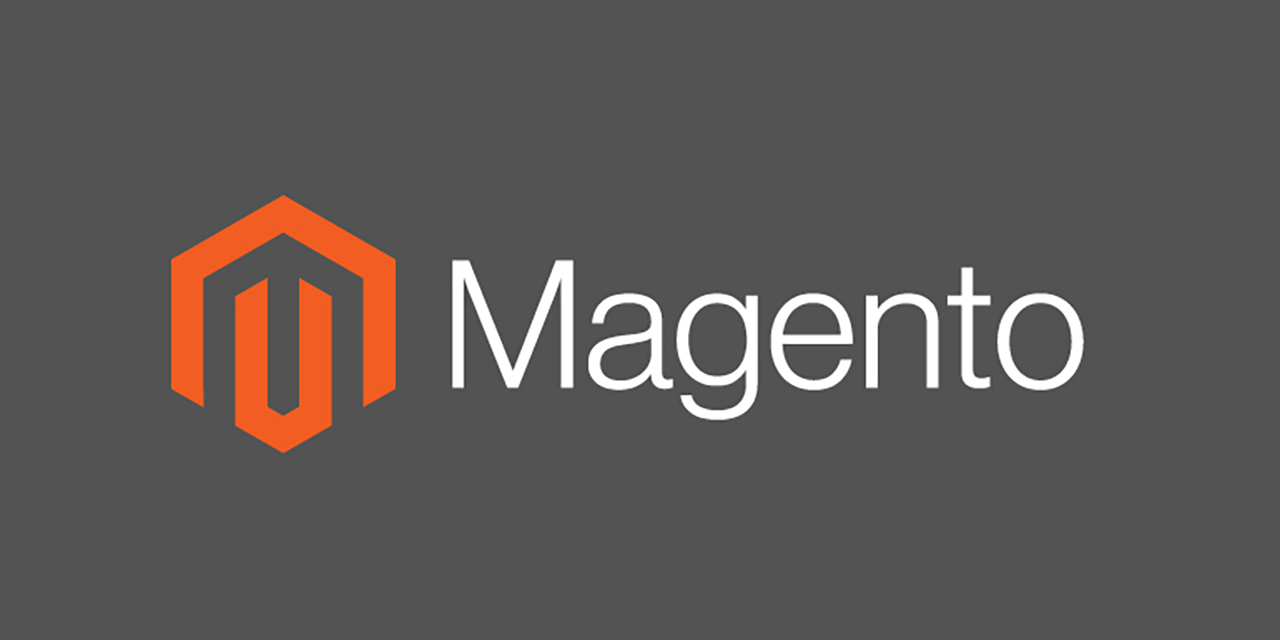
Magento is a powerhouse in the e-commerce realm, renowned for its robust and versatile nature. It caters to businesses of all sizes, from small startups to large enterprises. The platform consists of a comprehensive set of features and customization options.
It is an open-source platform, offering users the benefit of control. This means business owners revamp the appearance and functionality without compromising user experience.
Magento is an e-commerce specialist and powers around 180k websites globally. Magento 2 is the latest of the versions and offers enhanced features.
Magento Key Features:
This platform comes with several essential features that enrich the business processes for a better outcome –
- Open-Source Architecture: Magento’s open-source nature provides unparalleled flexibility, allowing businesses to customise and extend the platform to meet their specific requirements.
- Scalability: Apart from the open-source architecture, there is another option to explore for businesses planning to scale – feature-rich Magento Commerce. It efficiently manages an expanding product catalogue, handles increased traffic, and adapts to the evolving needs of the online store.
- Multi-Store Management: Magento’s multi-store management feature allows multiple online store management with centralised control. It simplifies administration and maintenance tasks and allows effortless expansion of business.
- SEO Optimisation: Magento is equipped with powerful SEO features, facilitating better visibility on search engines. It includes customisable URLs, metadata options, and sitemaps for improved search engine rankings.
- Mobile Responsiveness: With mobile commerce trending, Magento ensures a seamless experience, across devices. The platform offers mobile HTML5 technology and enhances accessibility for a broader demographic.
- Versatile CMS: Magento’s Content Management System manages all forms of content with utmost versatility. Businesses can perform various activities – creating pages, blog posts, product pages and more. The intuitive drag-and-drop interface is beginner-friendly and customisable.
- Extensive Community: The Magento Community comprises expert developers, designers and merchants. Any challenges a new business faces will find immediate help.
- Marketplace Integration: This feature allows seamless connection with mammoth marketplaces like Amazon. This feature increases brand visibility and a sizeable customer base.
Recent Magento Updates:
- The latest Magento version is 2.4 and offers over 300+ enhancements and fixes.
- The payment methods for Braintree have been refined and now offer added security and fraud protection.
- The release has fixed reCAPTCHA issues during admin login.
- The storefront now has descriptive names on buttons for accessibility.
Businesses who utilised Magento, experienced:
- A jam-packed e-commerce platform and a secure open-source framework.
- The massive theme library is fitting for all e-commerce stores.
- Limitless extensions using PHP
- Compatible with most hosting and cloud solutions.
#4. Drupal Commerce

Drupal Commerce is seamlessly integrated with the powerful Drupal Content Management System (CMS). The platform offers a flexible and feature-rich solution for businesses seeking a robust e-commerce platform. It provides a comprehensive toolkit for creating and managing online stores while leveraging the strengths of Drupal’s renowned content management capabilities.
It is also an open-source CMS but lacks a bit of user-friendliness for a beginner-level small business.
Drupal Commerce Key Features:
Drupal Commerce is rarely discussed compared to its competitors. However, this platform has an extensive set of features to benefit from –
- Flexible CMS: Drupal’s content management capabilities empower businesses to create dynamic and engaging content, enhancing the overall customer experience. The CMS interface follows a WYSIWYG structure (What You See is What You See). This Content-first approach allows businesses to prioritise brand narratives and create a more immersive and personalised shopping experience.
- Scalable Architecture: The platform’s modular approach allows businesses to choose and integrate necessary components. Businesses can flexibly embrace scalability without the concern of size. The platform can accommodate the growing product catalogues and increasing traffic.
- Mobile-First Approach: With the significance of mobile commerce, Drupal ensures optimised online stores. The platform’s responsive capabilities allow website development that adapts to multiple devices.
- Integrated Multilingual Support: Drupal Commerce includes integrated multilingual support of over 100 languages. It enables businesses to reach a global audience by providing content and product information in multiple languages.
- SEO and Marketing: Drupal offers extensive SEO and marketing tools to make the store highly visible. It seamlessly manages SEO functions – metadata, sitemaps, URL structure and more.
- API Support – Drupal Commerce is fundamentally API-oriented. The platform is open to integration with a vast range of technologies. It allows developers to create function-rich e-commerce platforms and expand functionalities.
Recent Drupal Updates:
- The new administration theme called Claro provides an enhanced user-friendly e-commerce website.
- Introduction of a new default theme: Olivero. It is a modern theme with a streamlined and user-focused interface. The primary of this theme is increased accessibility.
- The Theme Starkit Tool enables the seamless creation of custom themes for online stores.
- Advanced security measures with strict password policies.
- Improved cache mechanism that makes content caching easier and speeds up website performance.
Businesses that utilized Drupal, experienced:
- A robust, threat-mitigated e-commerce environment that is free from security vulnerabilities.
- A tried and tested flexible CMS that powerfully handles content better than any other e-commerce platform.
- Expansive community support filled with expert Drupalers that helps users with easy to complex solutions.
#5. OpenCart
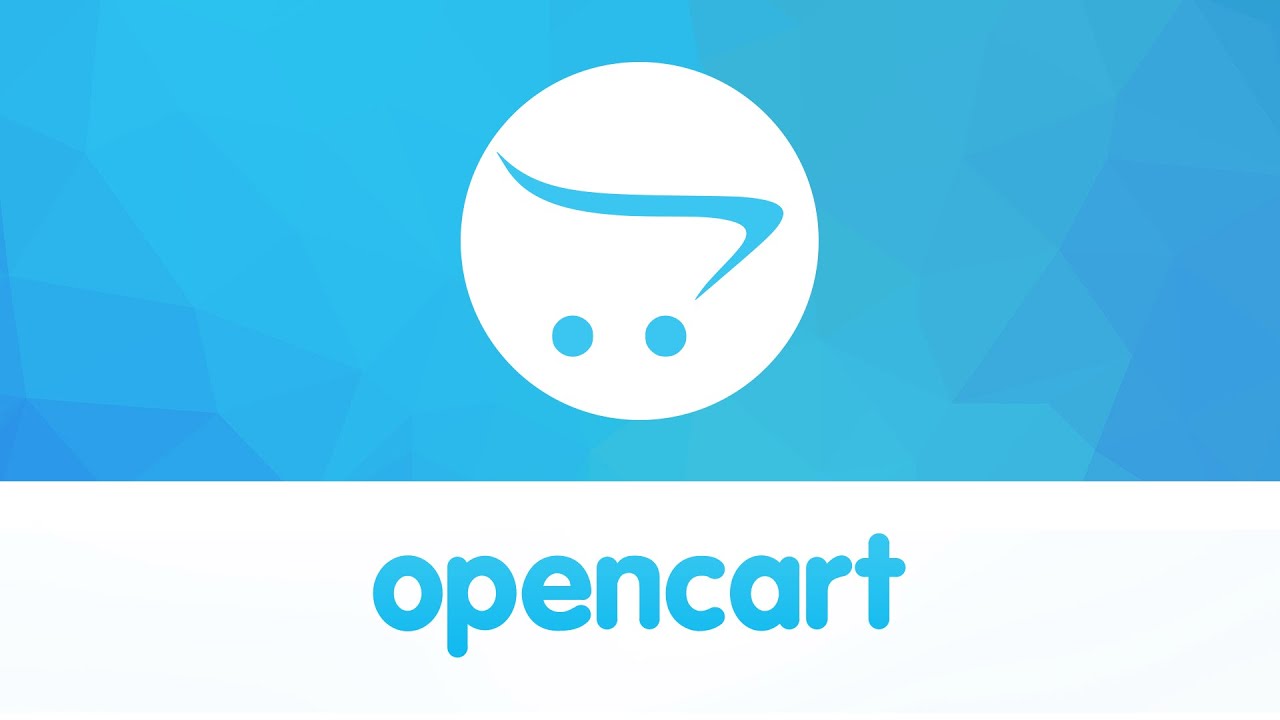
OpenCart is also an open-source e-commerce platform. Any business owner can download and use it without any fixed monthly fees. The platform offers robust features to manage e-commerce stores. It benefits in SEO, product management, customer monitoring and more.
Presently, OpenCart caters to 284K global businesses, and the platform has a dedicated community to support these businesses during complexities.
OpenCart offers a flexible and scalable model for a business planning to expand. The exceptional assortment of themes and modules helps enhance the store’s functionality based on business size.
OpenCart Key Features:
Here are a few of the top OpenCart features that e-commerce business owners can find essential to perform multiple operations –
- Insights and Analytics: The OpenCart dashboard is efficiently equipped with insights and analytics for a quick overview of website performance. It has user-friendly access to customer lists, number of orders, sales analytics and more. The dashboard can optimised according to needs and helps users track performance reports to strategise.
- Multi-Store Feature: Like some of its competitors, OpenCart also empowers multi-store management from a singular dashboard. The streamlined process easily lists products in separate stores, and one can choose unique themes.
- Payment Feature: OpenCart flawlessly collaborates with the latest payment providers with no extra cost or transaction fee.
- Unlimited Product Categories: Some e-commerce platforms charge extra after a certain number of product categories. OpenCart has eased out this process by offering an infinite number of product categories without additional cost.
- Affiliate management: OpenCart equips an in-built Affiliate system. Businesses can promote specific products and set a percentage for the affiliates to boost and earn. Different affiliate payment setups are available – cheque, PayPal, transfer, etc.
Recent OpenCart Updates:
Open Cart version 4 is the latest release.
- The new version is enhanced in terms of performance and scalability.
- The CKeditor is back as the community enjoyed it; it has replaced the Summer Note Text Editor.
- This version is compatible with PHP 8.1 and higher. This duo performs significantly in terms of high website speed.
- New design and theme changes ensure higher customer engagement.
Businesses that utilised OpenCart, experienced
- A flexible platform with strong native ability that allows easy integration to multiple payment gateways.
- Easy to set up and configure website cart with pre-made templates.
- A free platform for business owners with a tight budget.
#6. AVADA
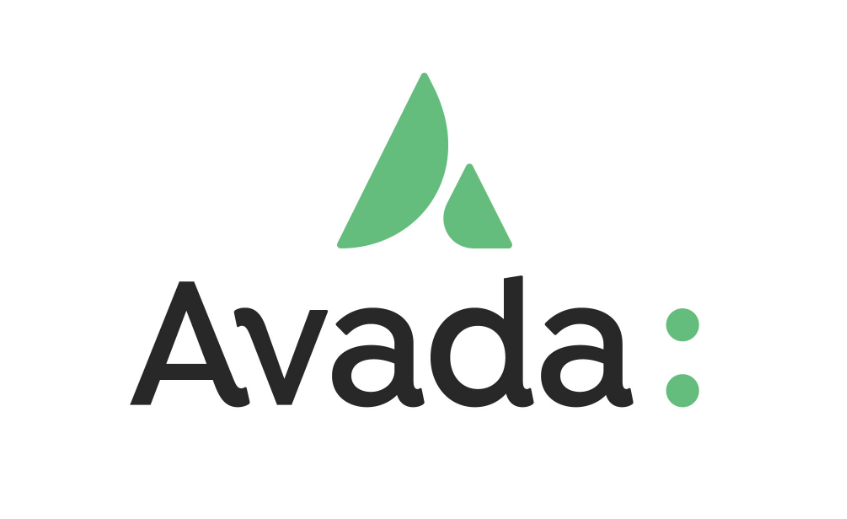
AVADA is a WordPress website builder that offers business owners an intuitive design platform. The builder has a comprehensive suite of design elements and pre-built templates. These templates are 100% customisation to enhance the overall e-commerce presence for customers and businesses.
Businesses can reap the benefits of AVADA Studio. It is an expansive library of multi-use designs made by professionals to speed up this business process.
It is the ultimate WordPress website-building toolkit that offers granular control over e-commerce website creation. Business owners do not need to be tech-savvy to handle AVADA. It is the #1 selling WordPress themes and is perfectly compatible with numerous plugins and third-party tools.
Pricing: The AVADA website builder theme costs around 55 GBP during installation. The platform has no other additional costs.
AVADA Commerce Key Features:
As mentioned, AVADA is the #1 selling WordPress website builder theme, it offers feature-packed e-commerce prowess –
- Advanced Option Network: The builder has an advanced option network. It means users can customise their websites endlessly without altering code. The organised dashboard entails all the theme customisation options that impact the entire website.
- Intuitive Builder: The platform has a visual front-end design editor that allows users to create clean, multi-purpose designs with an adaptive layout. It means the theme layout is responsive across devices and caters to businesses of various sizes.
- Integrations: The platform is compatible with the latest WordPress version and third-party tools. These include SEO tools, insights plugins, forms and many more. The seamless integration of these tools allows an amplified user experience.
- Speed Enhancements: The builder is pre-enhanced to offer a lightning-seed online presence. The javascript files are combined and minified to improve performance. The JS compiler for CSS compiles all the styles into one file for website speed.
- SEO-optimized: The platform is SEO-optimized to make the business website visible to browsers and users. It is also compatible with multiple SEO tools like All in One SEO and Yoast SEO.
Recent AVADA Updates:
- The latest version of Avada Builder is 7.11.
- A new range of designs has been added to the library as well as tons of new features.
- New prominent features include – Multi-step Avada Forms, Pixel Width and Flex Grow for Columns, Mailchimp group support, etc.
- For Woocommerce, users can create a Thank You page using the Avada Setup Wizard.
Businesses that utilized AVADA, experienced
- Constant support from the growing community and constant resolution of website concerns.
- Instructions and tutorials to help business owners navigate the platform better.
- Advanced options like typography, backgrounds, responsive image management, blog layouts and so on.
#7. Volusion

Volusion is a cloud-based e-commerce platform and is feature-packed to support professional e-commerce website creation.
The e-commerce builder is feasible for beginners and advanced users and has a powerful marketing suite.
Volusion is one of the oldest SaaS-based e-commerce building platforms and offers much-needed scalability for SMBs. Although the Volusion customer base is less expensive than WordPress or Shopify, the platform is feature-rich. Among its many features, the best to stand out is smooth order and inventory management.
Volusion has helped several businesses excel in the digital domain. The platform is PCI certified, meaning they are committed to offering merchant security.
Pricing: Volusion has a 14-day free trial followed by four types of pricing plans – Personal (£24 p/m), Professional (£64 p/m), Business (£239 p/m), and Prime (custom).
Volusion Key Features:
Being one of the oldest e-commerce platforms to thrive, Volusion offers some notable features beneficial to e-commerce merchants –
- Payment gateways: Volusion is compatible with a wide range of payment gateways. It includes various wallet options like Stripe and PayPal and digital wallets like Amazon and Apple Pay. This feature enables businesses to reach out to a broader customer base.
- Mobile App Support: The platform comes with its mobile app. It means businesses can control their website on the go. They can edit content, modify, check for orders and look into insights.
- App Integration: Volusion makes customisation super easy with app integrations. The platform supports 1000+ app integrations through Zapier. It includes customer management, accounts, marketing and many more.
- Security Measures: Volusion handles e-commerce security with sound methods. The platform uses an AES-256 encryption algorithm to secure customer data and payment details. It keeps the websites free from potential cyber-attacks and protected by a firewall.
- Search Engine Optimisation: Volusion does not offer a blogging feature. However, there are SEO enablers to ensure the websites are visible to the search engine. The web pages have fields to optimise Meta titles, and descriptions, and have custom meta options to supercharge SEO abilities.
Recent Volusion Updates:
- The latest version of Volusion is version 13.
- Introduction of Premium Checkout feature to simplify customer’s payment experience. This offers a seamless payment interface with multiple options and guest checkout.
- Multiple payment methods without any extra cost (Transaction fee present). This includes credit cards, debit cards, country-specific payments, and PayPal Express.
- Automated tax compliance for merchants to ensure they adhere to local and federal tax laws.
Businesses that utilised Volusion experienced:
- Simplified interface and is great for digital beginners. The initial setup does not involve a massive learning curve.
- A great no-code platform to venture into the e-commerce domain.
#8. Wix Website Builder

Wix is a renowned website builder that offers a versatile, feature-rich platform to create stunning e-commerce stores. The platform stands out in this list of e-commerce solutions for its creative freedom. The builder is a no-code solution and helps create magnificent websites for various businesses.
Wix is famous for its easy-to-use drag-and-drop builder. Similar to Shopify, the platform is self-hosted. There is a vast library of templates to start with and customise according to business needs.
Wix-built websites have a wide range of tools to improve business operations and expedite digital success.
Currently, the platform powers 2 million live e-commerce websites, making it the 3rd best e-commerce platform after Shopify and Woocommerce. The platform has a proven record of elevating small and medium-scale businesses to newer heights.
Pricing: The platform has three structural pricing plans – Basic: £22 per month, Unlimited: £26 per month, VIP: £47 per month.
Wix Key Features:
Wix is the most innovative website builder for its feature-packed abilities. Here are a few that are beneficial to e-commerce businesses –
- Expansive Templates Library: Wix can make any website design an easy possibility. The platform has a library of 500+ stunning, designer-made website templates. Each of these is highly customisable, and the design elements can be deleted, modified and altered with the drag-and-drop method.
- Intuitive Drag-and-Drop Editor: Wix’s user-friendly interface empowers users to effortlessly design websites by simply dragging and dropping elements without needing coding skills. This intuitive process offers real-time visual feedback, allowing immediate adjustments and modifications.
- Customisable Templates: Wix provides a diverse selection of industry-specific templates that are mobile-responsive and easily customisable. These templates serve as a foundation, allowing users to personalise and modify layouts, fonts, colours, and other design elements to align with their brand identity and business needs.
- App Market: Wix’s App Market offers a wide range of integrations and add-ons, expanding the functionality of e-commerce sites with tools like analytics, live chat, and inventory management. Users can seamlessly integrate these apps, enhancing their website’s capabilities without complex technical procedures.
- Multi-Channel Selling: Wix facilitates sales across diverse platforms like social media (e.g., Facebook, Instagram) and online marketplaces (e.g., Amazon), enabling businesses to broaden their reach. With centralised management, consistent branding, increased visibility, and synchronised inventory levels across channels, this feature optimises sales strategies while maintaining a cohesive brand presence across different platforms.
- Payment Gateway Integrations: Supporting global transactions, Wix integrates with major payment gateways like PayPal, Stripe, and Square, ensuring secure and convenient payment processing for customers worldwide.
Recent Wix Updates:
- The latest version of Wix Toolset is version 4.
- Introduction of Adobe Express Integration to enhance your visual content and graphics directly within the platform.
- Simplified purchase process with swift and secure transactions using Google Pay.
- Site-level SEO Assistant to optimize the site’s search performance and SEO with tailored actions and recommendations.
Businesses who utilized Wix, experienced:
- A comprehensive suite of features and an expansive app store that facilitates growth and scalability.
- Abundant flexibility and creative autonomy to effortlessly customize templates and achieve the desirable.
- An intuitive drag-and-drop building tool that makes editing exceptionally user-friendly
#9. Prestashop
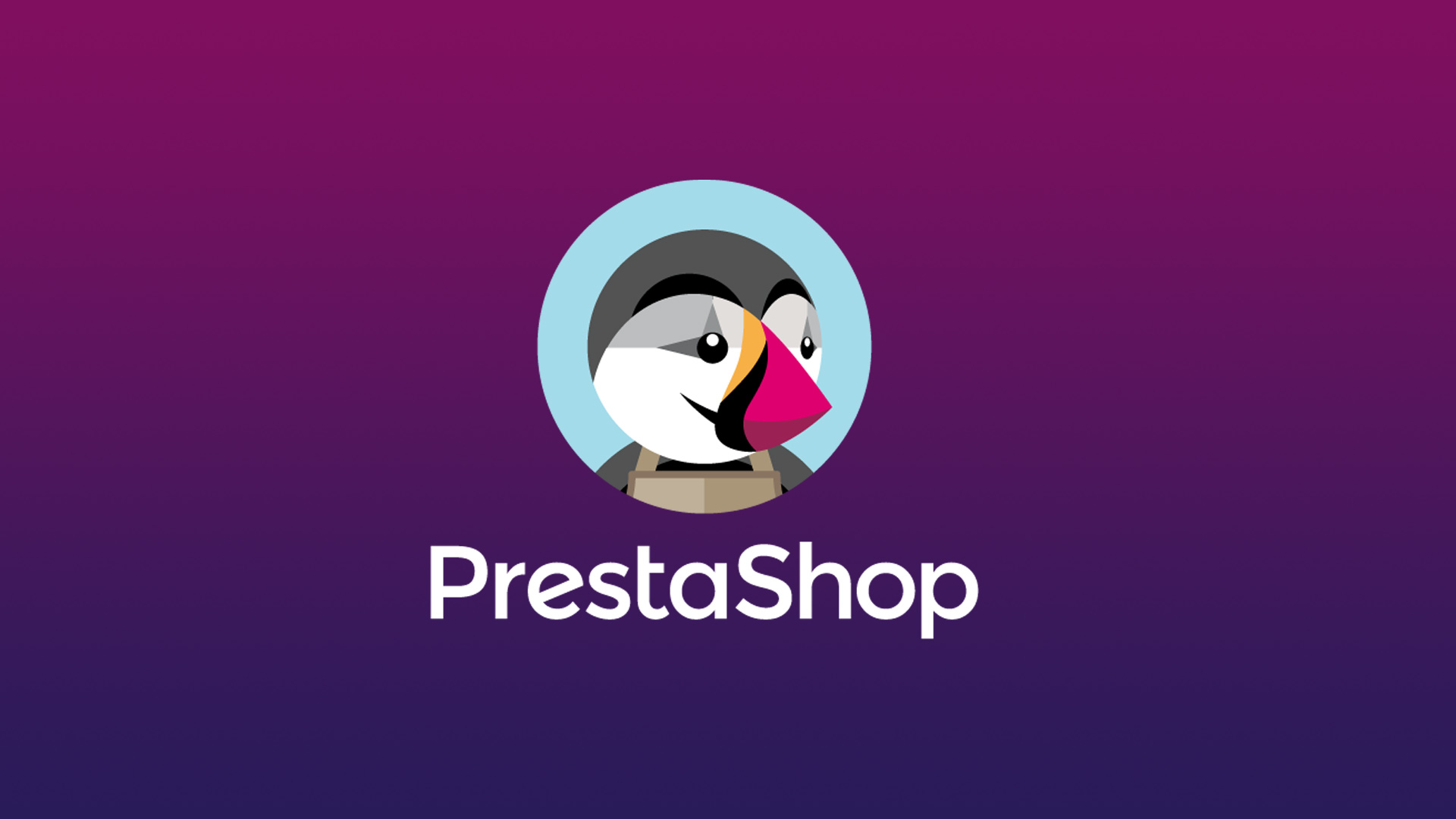
PrestaShop, a leading open-source e-commerce solution, stands out as a versatile choice for cloud-based eStores, offering a combination of user-friendly features and extensive capabilities. This free platform allows users to self-host their online shops, making it a popular option globally, with availability in approximately 65 languages.
While launching an online store with PrestaShop may require some initial effort, the platform rewards users with an array of impressive features and functionalities. The business model of PrestaShop centres on offering services to its customer base and commercial partners, encompassing themes and optional add-on features.
What sets PrestaShop apart is its commitment to providing a comprehensive set of features free of cost, making it a compelling choice for businesses looking to establish and manage their online presence efficiently.
Pricing: Free, except for the cost of domain and hosting, this varies from 2 to 3 GBP.
PrestaShop Key Features:
PrestaShop, a feature-rich e-commerce platform, boasts over 300 built-in features –
- Store Builder: PrestaShop has an intuitive, WordPress-like dashboard, facilitating seamless store development. This feature-rich interface encompasses comprehensive navigation, detailed product listings, and robust search functionality. The user-friendly design streamlines the store creation process, empowering users to effortlessly establish an online presence.
- eMarketing: Enhancing the visibility of your online store is crucial, and PrestaShop excels in this aspect. It integrates in-built tools for product and catalogue SEO, optimising search placement.
- Free & Open Source: A notable advantage of PrestaShop is its status as a completely free and open-source platform. It allows users to develop fully customisable websites within minutes.
- Google Rich Snippets: With the importance of Google in driving website traffic, PrestaShop incorporates Google Rich Snippets. These snippets enhance search engine visibility by providing additional information about your products or services.
- Integrations: PrestaShop simplifies expansion with a diverse marketplace offering add-ons, themes, and premium support options. The partners’ directory provides additional assistance, ensuring seamless integration for launching and enhancing online stores.
Recent PrestaShop Updates:
- The latest PrestaShop version is 8.1.
- Merchants can now easily configure the shop’s password policy and efficiently manage customers.
- PrestaShop introduces support for WebP format images, enhancing the platform’s compatibility with modern image standards.
Businesses that utilised Prestashop, experienced:
- A highly customisable e-commerce platform that helps curate a unique web presence and enhanced user experience.
- Unlimited listing of products that improves the scope of scalability.
- A secure website with a free SSL certificate and PCI complaint.
#10. Squarespace
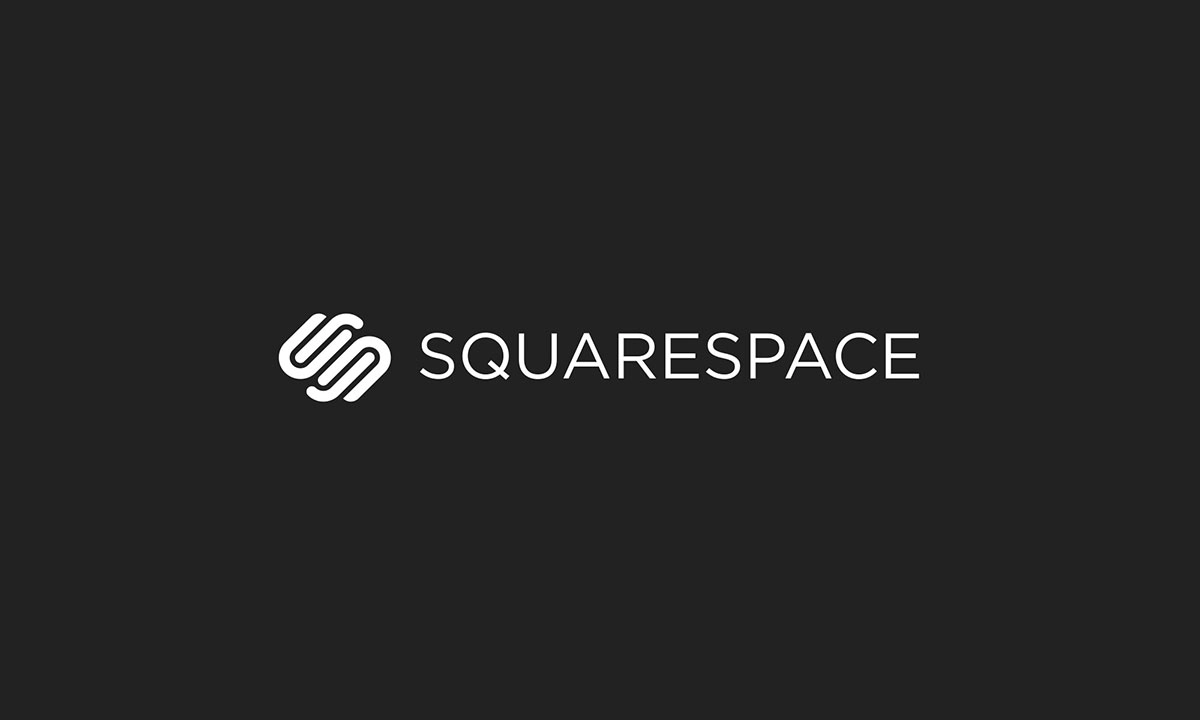
Squarespace is a user-friendly website builder established in 2003 in Maryland, USA. Initially a blog hosting service, it evolved into a robust platform, achieving $1 million in revenue by 2006.
Ideal for creative minds, Squarespace requires no coding skills. Users, particularly designers, artists, and photographers, can effortlessly create stunning websites with features like built-in eCommerce tools, custom domains, and SSL certificates.
With an intuitive interface and a range of design templates, Squarespace caters to various industries. Beyond aesthetics, Squarespace excels in SEO, helping small businesses garner attention in the digital landscape.
Pricing: The e-commerce plan starts from £22 and increases based on features.
Squarespace Key Features:
Squarespace, as an e-commerce platform, stands out with a plethora of features –
- Integrated Shopping Cart: Squarespace simplifies the shopping experience by providing an integrated shopping cart on your site. Customers can seamlessly browse products, add items, checkout, and make payments without being redirected.
- Flexible Product Management: Easily add products with detailed information such as photos, descriptions, pricing, and variants. Grouping products into categories and collections facilitates customer navigation.
- Multiple Payment Methods: Customers can choose from credit cards, PayPal, Apple Pay, and Stripe, ensuring quick and secure transactions.
Are you planning to start an e-commerce business in 2024? You will need a stunning website to begin with.
- The need for a functional website is the epitome of the e-commerce industry. However, building one from scratch without technical expertise can be daunting. Several small business owners struggle with understanding the perquisites of building websites.
- Their recurrent pain points are – how to launch a website? Which is the best ecommerce platform for business? What tools are required post-website launch?
- Let us solve the most dominant pain point today – Which platform is the best for e-commerce business?
- Choosing the right e-commerce platform is crucial to launching an e-commerce store. This step comes even before a website design plan. The right platform ensures smooth functionality and growth. In this rapidly advancing e-commerce industry, the perfect platform strengthens the foundation.
- There are multiple e-commerce platforms to choose from. Each platform has its unique features. It is essential to look for minor differences since these can heavily impact your online presence.
- This article will explore the 10-best e-commerce platforms, perfect for small businesses. We will share a detailed overview of each, their features and functionalities and the scope of scalability.
- We will also delve into their recent upgrades and real-time usage experiences to help you make an informed decision for your business.
Quick Comparison Chart
Here’s a concise comparison chart based on key features, pricing, strengths, and weaknesses of the mentioned e-commerce platforms:
E-commerce Platform: WooCommerce
- Key Features: Flexible, integrates with WordPress, customisable, extensive plugin library
- Pricing: Free (WordPress plugin), additional costs for hosting, domain, themes, and extensions
- Strengths: Scalability, community support, SEO-friendly
- Weaknesses: Requires WordPress knowledge, may need technical support for complex setups
E-commerce Platform: Shopify
- Key Features: User-friendly, all-in-one solution, extensive app store, reliable hosting, built-in security
- Pricing: Starts at £25/month, additional fees for apps and transactions
- Strengths: Beginner-friendly, excellent customer support, scalability
- Weaknesses: Transaction fees on non-Shopify payment gateways, limited customisation for some aspects
E-commerce Platform: Magento
- Key Features: Highly customisable, scalable, robust for large catalogues, strong community
- Pricing: Open-source (Community Edition) or Enterprise Edition (Expensive)
- Strengths: Scalability, flexibility, vast customisation options
- Weaknesses: Complex setup, requires technical expertise, resource-intensive
E-commerce Platform: Drupal Commerce
- Key Features: Integrates with Drupal CMS, flexible content management, customisable
- Pricing: Free (Drupal and Commerce modules), additional costs for hosting, themes, and modules
- Strengths: Highly customisable, integrates with Drupal’s content capabilities
- Weaknesses: Steeper learning curve, may require development expertise
Ecommerce Platform: OpenCart
- Key Features: Lightweight, user-friendly admin interface, extensive extension marketplace
- Pricing: Free, additional costs for themes, extensions, and hosting
- Strengths: Easy to set up, multilingual support, lightweight
- Weaknesses: Limited scalability for larger stores, fewer built-in features compared to other platforms
E-commerce Platform: AVADA
- Key Features: Highly customisable theme, drag-and-drop builder, extensive design options
- Pricing: One-time purchase at £55 for a regular license
- Strengths: Versatile design options, drag-and-drop functionality
- Weaknesses: Not a standalone e-commerce platform, requires additional plugins for full e-commerce functionality
E-commerce Platform: Volusion
- Key Features: All-in-one solution, easy to use, built-in analytics, and customer management tools
- Pricing: Starts at £24/month, additional costs for bandwidth, themes, and add-ons
- Strengths: User-friendly, built-in features, scalable
- Weaknesses: Limited design customisation, transaction fees, some features restricted to higher plans
E-commerce Platform: Wix
- Key Features: Drag-and-drop website builder, easy setup, various design templates
- Pricing: E-commerce plans start at £22/month, additional costs for apps and transactions
- Strengths: User-friendly, extensive template library, drag-and-drop editor
- Weaknesses: Limited scalability for complex stores, may encounter restrictions in advanced functionality
E-commerce Platform: PrestaShop
- Key Features: Customisable, multilingual support, extensive module marketplace
- Pricing: Free (open-source), additional costs for hosting, themes, and modules
- Strengths: Highly customisable, multilingual support, extensive add-ons
- Weaknesses: Technical expertise required for advanced customisation, limited customer support
E-commerce Platform: Squarespace
- Key Features: Beautiful design templates, intuitive interface, all-in-one solution
- Pricing: Starts at £22/month (personal plan), higher pricing for e-commerce plans
- Strengths: Elegant design, user-friendly, integrated solutions
- Weaknesses: Limited payment gateway options, less customisable compared to some competitors
The best platform for an individual or business depends on specific needs, technical expertise, budget, scalability, and desired features.
Embarking on the E-commerce Journey
This article educates you on the top 10 ecommerce platforms and their ability to power an online store. Thoroughly evaluate the factors while choosing the best platform for your business.
Each platform offers unique features and tools to facilitate business growth. They have varied pricing models and strengths to impact the objectives. Compare each to understand which is the most suitable for your business.
The ideal platform depends on your business size and operations. Explore each to get a real-time understanding of the functionalities. If you find it confusing, get in touch with professionals.
Webskitters Ltd. is the best ecommerce web development company to help you begin the retail journey. Our team of experts excels at developing competitive e-commerce websites. With years of experience as an ecommerce development agency London, we understand which platform will suit you the best.
Contact us for your first business website!

